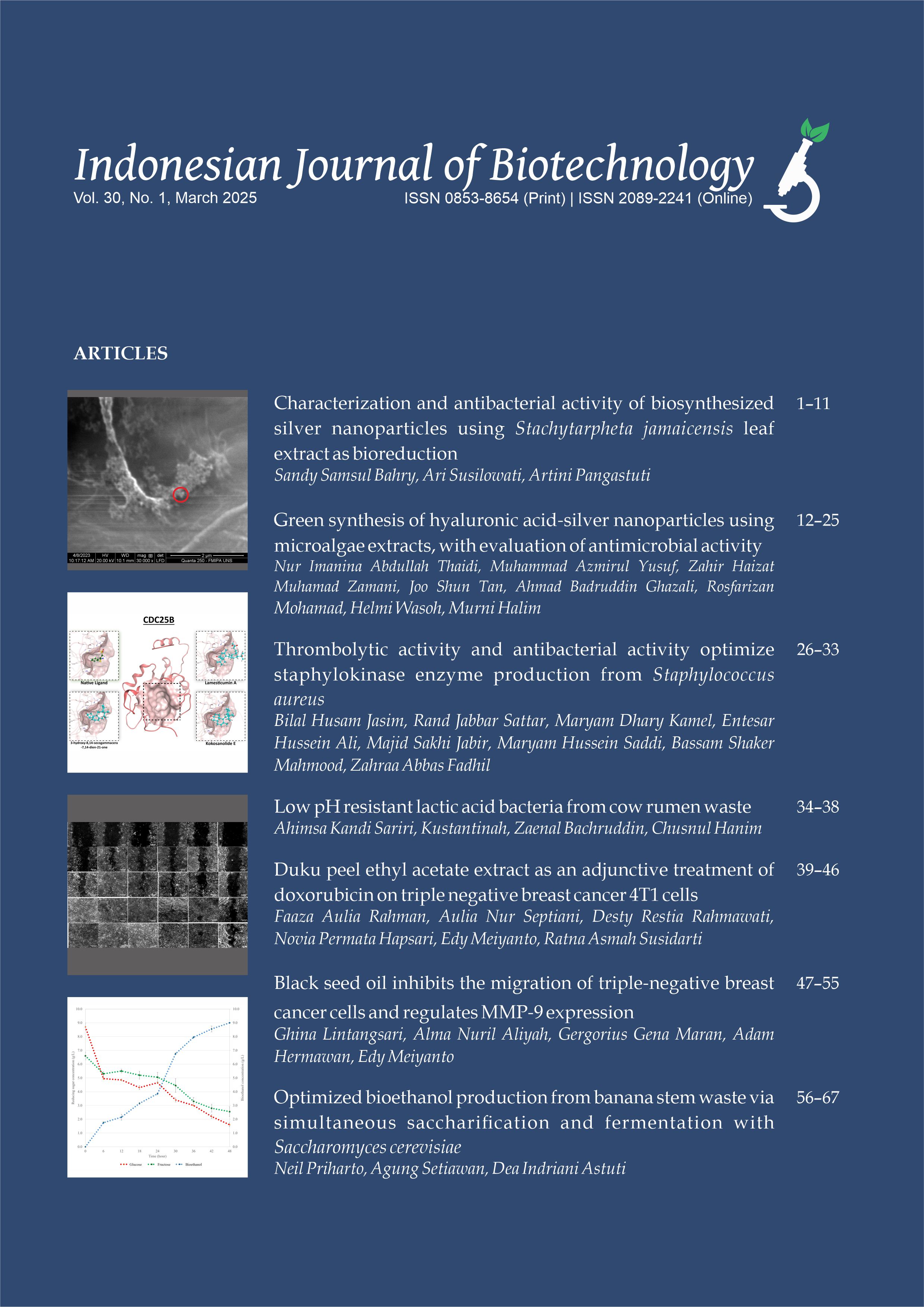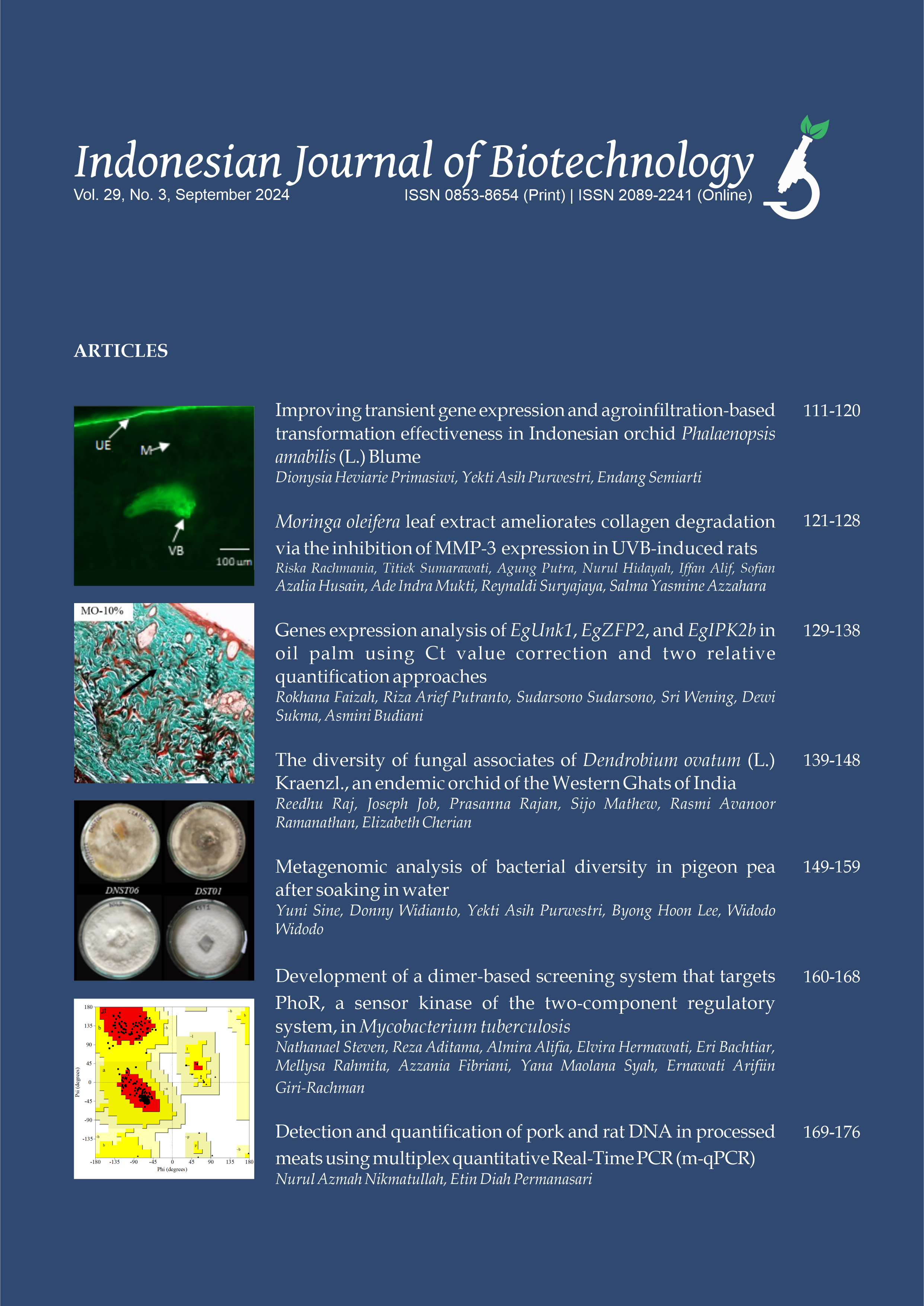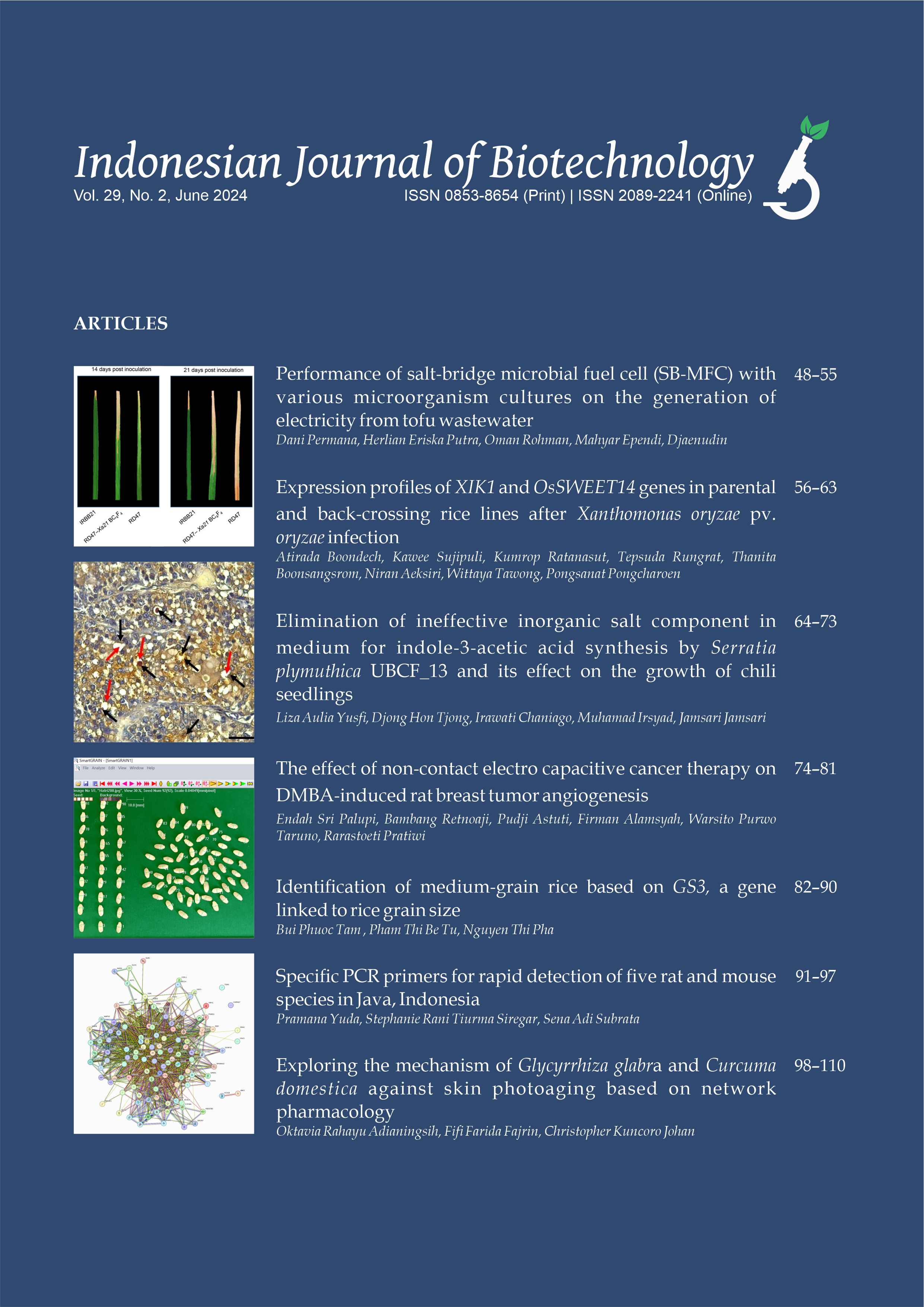In vitro expression of the recombinant fusion protein of Newcastle disease virus from local Indonesian isolates by using a cell-free protein expression system
Aris Haryanto(1), Hevi Wihadmadyatami(2), Nastiti Wijayanti(3*)
(1) Department of Biochemistry and Molecular Biology, Faculty of Veterinary Medicine, Universitas Gadjah Mada, Jl. Fauna No. 2, Karangmalang, Yogyakarta 55281
(2) Department of Anatomy, Faculty of Veterinary Medicine, Universitas Gadjah Mada, Jl. Fauna No. 2, Karangmalang, Yogyakarta 55281
(3) Laboratory of Animal Physiology, Faculty of Biology, Universitas Gadjah Mada, Jl. Teknika Selatan, Sekip Utara, Bulaksumur, Yogyakarta 55281
(*) Corresponding Author
Abstract
The aim of this work was the in vitro expression of the recombinant fusion (F) protein of Newcastle disease virus (NDV). The pBT7-N-His-Fusion-NDV expression plasmid which carries the recombinant F protein encoding gene from local Indonesian isolates, was prepared and transformed into E. coli BL21 (DE3). To detect bacterial colonies carrying the recombinant plasmid, a restriction endonuclease analysis was performed using the EcoRI restriction endonuclease. These results showed that the pBT-N-His-Fusion-NDV plasmid was successfully isolated with a size of 4.601 bp, and three recombinant plasmids carrying the gene coding for the recombinant F protein of NDV were obtained. Selected recombinant plasmids were then in vitro by using a cell-free protein expression system followed by visualization of the recombinant F protein on a 12% SDS-PAGE gel both by Coomassie Brilliant Blue staining and Western blotting. Recombinant F protein was successfully in vitro expressed by using a cell-free protein expression system as indicated by a specific single protein band with a molecular mass of 25.6 kDa.
Keywords
Full Text:
PDFReferences
Alexander DJ. 2003. Newcastle Disease, Other Avian Paramyxoviruses, and Pneumovirus Infections. In: Y Salf, H Brnes, J Glisson, A Fadly, L Mc Douglad, D Swayne, editors, Diseases of Poultry. Ames: Iowa State Press, 11th edition. p. 63–100.
Alexander DJ, Aldous EW, Fuller CM. 2012. The long view: a selective review of 40 years of Newcastle disease research. Avian Pathol. 41(4):329–335. doi:10.1080/03079457.2012.697991.
Arora P, Lakhchaura BD, Garg SK. 2010. Evaluation of immunogenic potential of 75kDa and 56kDa proteins of Newcastle disease virus (NDV). Indian J Exp Biol 48(9):889–895.
Bioneer. 2016. Vector Information: pBT7NHis.
Burgess RR. 2009. Chapter 17 Refolding Solubilized Inclusion Body Proteins. In: RR Burgess, MP Deutscher, editors, Methods in Enzymology: Vol 463 Guide to Protein Purification, volume 463. Academic Press Inc., 2nd edition. p. 259–282. doi:10.1016/S00766879(09)630172.
Chang A, Dutch RE. 2012. Paramyxovirus fusion and en try: Multiple Paths to a common end. Viruses 4:613– 636. doi:10.3390/v4040613.
Chen L, Colman PM, Cosgrove LJ, Lawrence MC, Lawrence LJ, Tulloch PA, Gorman JJ. 2001. Cloning, expression, and crystallization of the fusion protein of Newcastle disease virus. Virology 290(2):290–299. doi:10.1006/viro.2001.1172.
Chen Y, Xing XH, Ye F, Kuang Y, Luo M. 2007. Production of MBPHepA fusion protein in recombinant Escherichia coli by optimization of culture medium. Biochem Eng J. 34(2):114–121. doi:10.1016/j.bej.2006.11.020.
De Leeuw O, Peeters B. 1999. Complete nucleotide sequence of Newcastle disease virus: Evidence for the existence of a new genus within the subfamily Paramyxovirinae. J Gen Virol. 80(1):131–136. doi:10.1099/00221317801131.
De Mattos JC, Dantas FJ, CaldeiraDeAraújo A, Moraes MO. 2004. Agarose gel electrophoresis system in the classroom: Detection of DNA strand breaks through the alteration of plasmid topology. Biochem Mol Biol Educ. 32(4):254–257. doi:10.1002/bmb.2004.494032040382.
Dharmayanti NI, Risza H, Dyah AH, Risa I. 2014. Phylogenetic analysis of genotype VII of new castle dis ease virus in Indonesia. African J Microbiol Res. 8(13):1368–1374. doi:10.5897/ajmr2014.6601.
Dortmans JC, Koch G, Rottier PJ, Peeters BP. 2011. Virulence of Newcastle disease virus: What is known so far? Vet Res. 42(1). doi:10.1186/1297971642122.
Ganar K, Das M, Sinha S, Kumar S. 2014. Newcastle disease virus: Current status and our understanding. Virus Res. 184:71–81. doi:10.1016/j.virusres.2014.02.016.
Grand LRL, White M, Siegel EB, Barnard RT. 2012. Recombinant Vaccines: Development, Production, and Application. In: O Kayser, H Warzecha, edi tors, Pharmaceutical Biotechnology: Drug Discovery and Clinical Applications, chapter 17. Hoboken (NJ): John Wiley & Sons, Ltd}„ 2nd edition. p. 423—449. doi:10.1002/9783527632909.ch17.
Haryanto A, Ermawati R, Wati V, Irianingsih SH, Wijayanti N. 2016. Analysis of viral protein2 encoding gene of avian encephalomyelitis virus from field specimens in Central Java region, Indonesia. Vet World. 9(1):25–31. doi:10.14202/vetworld.2016.2531.
Haryanto A, Purwaningrum M, Verawati S, Irianingsih SH, Wijayanti N. 2015. Pathotyping of Local Isolates Newcastle Disease Virus from Field Specimens by RTPCR and Restriction Endonuclease Analysis. Procedia Chem. 14:85–90. doi:10.1016/j.proche.2015.03.013.
Hodgman CE, Jewett MC. 2012. Cellfree synthetic biology: Thinking outside the cell. Metab Eng. 14(3):261–269. doi:10.1016/j.ymben.2011.09.002.
Jeon WJ, Lee EK, Lee YJ, Jeong OM, Kim YJ, Kwon JH, Choi KS. 2008. Protective efficacy of commercial in activated Newcastle disease virus vaccines in chick ens against a recent Korean epizootic strain. J Vet Sci. 9(3):295–300. doi:10.4142/jvs.2008.9.3.295.
Kim SH, Wanasen N, Paldurai A, Xiao S, Collins PL, Samal SK. 2013. Newcastle Disease Virus Fusion Protein Is the Major Contributor to Protective Immunity of GenotypeMatched Vaccine. PLoS ONE 8(8). doi:10.1371/journal.pone.0074022.
King AM, Adams MJ, Carstens EB, Lefkowitz EJ. 2012. Virus Taxonomy: Classification and Nomenclature of Viruses. Elsevier. doi:10.1016/B978012384684 6.000574.
Lamb R, Parks G. 2007. Fields’ Virology, Volume 1. In: BN Fields, DM Knipe, PM Howley, editors, Paramyxoviridae: the viruses and their replication. Philadelphia: Lippincott, Williams and Wilkins, 5th edition. p. 1449–1496.
Larentis AL, Nicolau JFMQ, Esteves GDS, Vareschini DT, De Almeida FVR, Dos Reis MG, Galler R, Medeiros MA. 2014. Evaluation of preinduction temperature, cell growth at induction and IPTG concentration on the expression of a leptospiral protein in E. coli using shaking flasks and microbioreactor. BMC Res Notes. 7(1). doi:10.1186/175605007671.
Larentis AL, Sampaio HDCC, Martins OB, Rodrigues MI, Alves TLM. 2011. Influence of induction conditions on the expression of carbazole dioxygenase components (CarAa, CarAc, and CarAd) from Pseudomonas stutzeri in recombinant Escherichia coli us ing experimental design. J Ind Microbiol Biotechnol. 38(8):1045–1054. doi:10.1007/s1029501008792.
Makrides SC. 1996. Strategies for achieving highlevel expression of genes in Escherichia coli. Microbiol Rev. 60(3):512–538. doi:10.1128/mmbr.60.3.512538.1996.
Middelberg AP. 2002. Preparative protein refolding. Trends Biotechnol. 20(10):437–443. doi:10.1016/S01677799(02)020474.
Miller PJ, King DJ, Afonso CL, Suarez DL. 2007. Antigenic differences among Newcastle disease virus strains of different genotypes used in vac cine formulation affect viral shedding after a virulent challenge. Vaccine 25(41):7238–7246. doi:10.1016/j.vaccine.2007.07.017.
Morrison TG. 2003. Structure and function of a paramyxovirus fusion protein. Biochim Biophys Acta, Biomembr. 1614(1):73–84. doi:10.1016/S0005
Nascimento IP, Leite LC. 2012. Recombinant vaccines and the development of new vaccine strategies. Brazilian J Med Biol Res. 45(12):1102–1111. doi:10.1590/S0100879X2012007500142.
Njoto EN, Scotch M, Bui CM, Adam DC, Chughtai AA, MacIntyre CR. 2018. Phylogeography of H5N1 avian influenza virus in Indonesia. Transboundary Emerg ing Dis. 65(5):1339–1347. doi:10.1111/tbed.12883.
[OIE] Office International of Epizootics. 2012. Newcastle disease infection with Newcastle disease virus.
[OIE] Office International of Epizootics. 2015. Old classification of diseases notifiable to the OIE: List A. URL http://www.oie.int/en/animalhealthintheworld/th eworldanimalhealthinformationsystem/oldclass ificationofdiseasesnotifiabletotheoielista/.
Parede LH, Sapats S, Gould G, Rudd M, Lowther S, Ignjatovic J. 2003. Characterization of infectious bursal disease virus isolates from Indonesia indi cates the existence of very virulent strains with unique genetic changes. Avian Pathol. 32(5):511– 518. doi:10.1080/0307945031000154116.
Park JK, Lee DH, Yuk SS, TserenOchir EO, Kwon JH, Noh JY, Kim BY, Choi SW, Kang SM, Lee JB, et al. 2014. Viruslike particle vaccine confers protection against a lethal Newcastle disease virus challenge in chickens and allows a strategy of differentiating infected from vaccinated animals. Clin Vaccine Immunol. 21(3):360–365. doi:10.1128/CVI.0063613.
Putri CN, Haryanto A. 2019. Fusion recombinant protein expression of Newcastle disease virus from Escherichia coli Cloned C1a using accurapidTM protein expression kit. IOP Conference Series: Earth and Environmental Science 355(1). doi:10.1088/1755 1315/355/1/012026.
Qiagen. 2001. The QIA expressionist: a handbook for highlevel expression and purification of 6xHis tagged protein.
Ramos CR, Abreu PA, Nascimento AL, Ho PL. 2004. A highcopy T7 Escherichia coli expression vector for the production of recombinant proteins with a mini mal Nterminal histagged fusion peptide. Brazillian J Med Biol Res. 37(8):1103–1109. doi:10.1590/S0100 879X2004000800001.
Rosano GL, Ceccarelli EA. 2014. Recombinant pro tein expression in Escherichia coli: Advances and challenges. Frontiers in Microbiology 5(APR). doi:10.3389/fmicb.2014.00172.
Sambrook J, Green M. 2012. Molecular Cloning: A Lab oratory Manual. New York: Cold Spring Harbor Lab oratory Press, 4th edition.
Terpe K. 2003. Overview of tag protein fusions: From molecular and biochemical fundamentals to commercial systems. Appl Microbiol Biotechnol. 60(5):523– 533. doi:10.1007/s0025300211586.
Volontè F, Marinelli F, Gastaldo L, Sacchi S, Pilone MS, Pollegioni L, Molla G. 2008. Optimization of glutaryl7aminocephalosporanic acid acylase ex pression in E. coli. Protein Expression Purif. 61(2):131–137. doi:10.1016/j.pep.2008.05.010.
Wilson K, Walker J. 2010. Principles and Techniques of Biochemistry and Molecular Biology. Cam bridge: Cambridge University Press, 7th edition. doi:10.1017/cbo9780511841477.
Wulanjati M. 2016. Ekspresi protein recombinant Fusion (F) virus Newcastle disease isolat lokal pada Escherichia coli BL21 (DE3) [Expression of recombinant Fusion (F) protein of Newcastle Disease Virus from local isolates on Escherichia coli BL21 (DE.3)]. Master thesis, Universitas Gadjah Mada.
Wulanjati MP, Wijayanti N, Haryanto A. 2018. Phylo genetic analysis of Newcastle disease virus from Indonesian isolates based on DNAsequence of fusion proteinencoding gene. Biotechnology 17(2):69–74. doi:10.3923/biotech.2018.69.74.
Xiao S, Paldurai A, Nayak B, Samuel A, Bharoto EE, Prajitno TY, Collins PL, Samal SK. 2012. Complete Genome Sequences of Newcastle Dis ease Virus Strains Circulating in Chicken Populations of Indonesia. J Virol. 86(10):5969–5970. doi:10.1128/jvi.0054612.
Yang Z, Zhang L, Zhang Y, Zhang T, Feng Y, Lu X, Lan W, Wang J, Wu H, Cao C, Wang X. 2011. Highly efficient production of soluble proteins from insoluble inclusion bodies by a TwoStep Denaturing and refolding method. PLoS ONE 6(7). doi:10.1371/journal.pone.0022981.
Article Metrics
Refbacks
- There are currently no refbacks.
Copyright (c) 2020 The Author(s)

This work is licensed under a Creative Commons Attribution-ShareAlike 4.0 International License.









